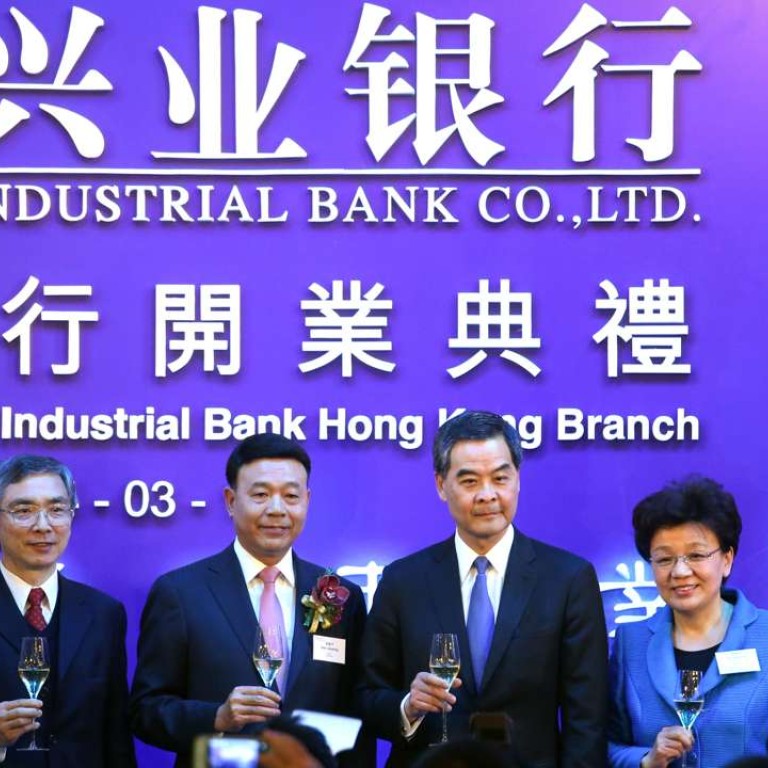
Industrial Bank finds a way to pass on local government bond burden, by selling them on to P2P customers
Crowd-funding platform Caimao says it will distribute 600 million yuan worth of securitised local government bonds
In a first among mainland China banks, Fujian-based Industrial Bank has found a way to use securitisation to wriggle free of the local government bonds investment burden all such banks face. The solution is simple: bundling them for sale online to peer-to-peer (P2P) investors.
Mainland online P2P crowd-funding platform Caimao said last week it had clinched a deal with Industrial Bank, which would see its local government bond portfolio securitised and distributed to investors online.
In the first batch of product to be sold under the agreement, 600 million yuan (HK$720 million) worth of local government bonds held on Industrial Bank’s balance sheet would be bundled and distributed onwards by Caimao. The bonds are local government debt that has gone to fund infrastructure investments. Investors would receive the cash flows to be generated from the payments from the bonds but also bear the risk stemming from the exposure to the local government. The portfolio is expected to mature in five years.
We service local governments in their debt swaps
Industrial Bank will get to free up valuable balance sheet real estate, while the hot potato of the local government bonds will be passed on to investors.
Mainland banks, force fed by the authorities, have been the main investors in local government bond issuances as part of an ambitious fiscal reform aimed at restructuring local government finance. Last year saw 2.8 trillion yuan of local government bonds debut on the mainland bond market according to the latest figures from the Ministry of Finance.
Banks’ obligations to accept the new bonds and swap them for local governments’ old loans vary. Chongqing Rural Commercial Bank said its local government required it to take up 12 per cent of the 150 billion yuan of new issuance this year. Bank of Communication’s chief financial officer Wu Wei said in its results briefing the bank had swapped up to 88 billion worth of loans, out of the 280 billion of local government bonds it added to its portfolio last year, and would buy 7 per cent of the country’s new releases.
Mainland municipal governments issued some 915 billion yuan worth of bonds in the first three months of this year. The ministry caps the percentage of bonds that may be ushered onto the market every quarter, but it is unclear how much swapping of old loans is due to take place. Finance Minster Lou Jiwei said in December the debt-swap programme was saving local governments from interest expenses of 200 billion yuan – interest that would otherwise have been bank revenue.
Caimao founder Li Chong said it supported local government finance and securitisation.
“We service local governments in their debt swaps,” he said. “We help package soon-to-be-due local government loan portfolios and project finance portfolios and arrange the rights to the receivables to be sold, so the local governments can refinance the debt for cash.
“The other thing is to help local governments securitise privately placed bond issuances. The local governments can place their infrastructure projects into a portfolio, and issue securitised products through us based on the cash flows that will be generated by the infrastructures in the future.”
Li told mainland media Caimao was involved in pilot projects in the provinces of Zhejiang, Henan and Hainan, with the underlying portfolio surpassing 10 billion yuan and more municipal governments indicating interest.
But it is unclear how investors will react.
“While the transfer of local government debt from local government finance vehicles to China’s rapidly evolving bond market is positive, it does leave unanswered questions,” Manulife Asset Management analysts wrote in a research report on local bond issuance. “Perhaps key among these is how to price risk in the emerging municipal bond market.
Hang Seng Bank sells off HK$15.79 billion stake in Industrial Bank
“This is problematic as municipal bond issues at these rates [close to par with central government bonds] – under the swap programme and as municipal bonds – have not been received enthusiastically by investors. Indeed, the central government has had to sweeten the pot to incentivise local banks to purchase the bonds.”
Chen Shiyong, general manager in charge of financial institutions business at Industrial Bank in Shanghai, and Xia Weichun, head of Industrial Bank’s Hong Kong branch, both denied knowledge of the programme when contacted by the South China Morning Post and declined to comment.
Industrial Bank is due to release its 2015 results at the end of this month, when it will disclose its holdings of local government instruments.
Wu Wei, an analyst from the bank’s brokerage arm, Industrial Securities, estimated its involvement in such“non-standard products” to be close to a trillion yuan in his latest report on the bank, citing it as a key risk factor.
Huarong securities analysts Zhao Shasha and Liu Di said receivables from such “non-standard” products were the biggest interest earner at Industrial Bank and the risks were locked in. They cited its willingness to innovate and strong businesses ties with other financial institutions as Industrial Bank’s key competitive advantages.

